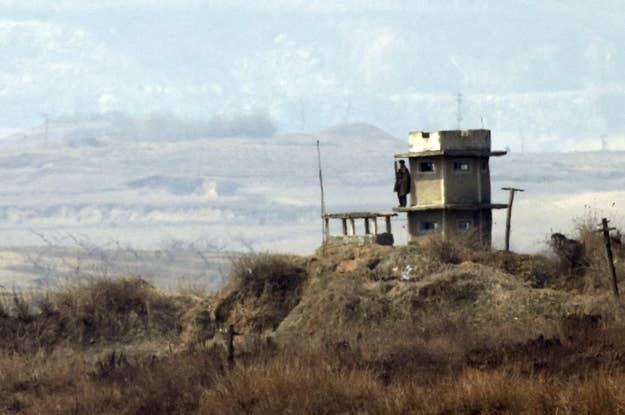
WASHINGTON — North Korea's intensified threats of war on the United States have been publicly greeted in the United States as, alternately, a kind of a joke and a mortal threat to cities like Austin.
But the real danger isn't an attack on America. Experts worry, instead, that the possibility of a second Korean War is more imminent than we'd like to believe.
"Though it remains in the area of bluster and rhetoric right now, it could escalate into a real conflict, more likely through miscalculation on either side," said Charles Armstrong, a professor of Korean studies at Columbia University. "Not only is North Korea making these very belligerent threats, but we have a new government in South Korea that is under a lot of pressure to react."
Threatening language from the North has been escalating for months, culminating in Wednesday's announcement that the military had gained "final approval" for a nuclear attack on the U.S., as well as their move to bar South Korean workers from the Kaesong industrial area. The state news agency recently released photos showing North Korea's missile attack plans for the U.S., though none of the missile paths were actually viable.
"A shooting war between North and South Korea is a real possibility, even if a North Korean nuclear strike on the US is not," Armstrong said. "Which would probably start very small, but could then escalate and involve the US."
A conflict between North and South Korea would likely thrust U.S. troops into the fray. The U.S. military, for its part, has appeared to take the threats seriously. A missile defense system was sent to Guam, and B-52 fighter jets were recently flown over South Korea as a show of force. Deputy Defense Secretary Ashton Carter promised Seoul everything available "offered by the US nuclear umbrella" on a visit there last month.
A war with the South would, analysts fear, come as a result of some low-level mishap, experts think, as opposed to a premeditated, purposeful strike.
Writing in Foreign Policy, Center for a New American Security scholar Patrick Cronin wrote on Thursday that "The Korean Peninsula is on a knife's edge, one fateful step from war."
"There is no single red line that, when crossed, would trigger war, but the potential for miscalculation and escalation is high," Cronin wrote. "The desire to show strength, the fear of looking weak, and the presence of tons of hardware provides more than enough tinder that a spark could start a peninsula-wide conflagration. An accident — such as a straying missile, an incident at sea or in the air, a shooting near the Northern Limit Line or the Demilitarized Zone — could trigger an action-reaction cycle that could spiral out of control if Pyongyang, running out of threats or low-level provocations, were to gamble on a more daring move."
Writing in the Nelson Report, an Asia policy email newsletter, Chris Nelson argued that the North's threats were intended to force the U.S. back to negotiations.
"The threat today is a loud plea to stop US 'hostility' and come back to the negotiating table," Nelson wrote. "The consensus is that war would be the result of accident or miscalculation, not deliberate intent, despite the hortatory, declarative language of things like [yesterday]'s announcement."
"While no one except hard-line US analysts thinks there will be a deliberate choice to risk war (by either side) everyone still worries very much about 'accident or miscalculation' risk, which if it involves what we're now calling 'kinetic' action (that sounds better than 'killing people on purpose', apparently) the risk being the ROK and perhaps the US will follow-through with the oft-threatened 'robust' retaliation," Nelson wrote. "Meaning a bigger hit than what was received. And then we'll be off to the races...a real danger...unless KJU and advisors 'lose their nerve' OR 'understand the risks and hold off'. Is either likely?"
Analysts argue that a war would spell the end of the Kim regime, but at great cost to the Korean peninsula, where about one million people died in the Korean War.
"It's been said for some time, and it's still true, that if there's a real war on the Korean peninsula the North would lose," Armstrong said. "The consequences would be devastating. It's something we don't really want to contemplate."
"Some people argue that the regime is weaker than it looks, but I don't think considering the history of North Korea that it would go without a very big fight," Armstrong said. "We have to work on an escape plan from this war of words that is continuing to escalate."
